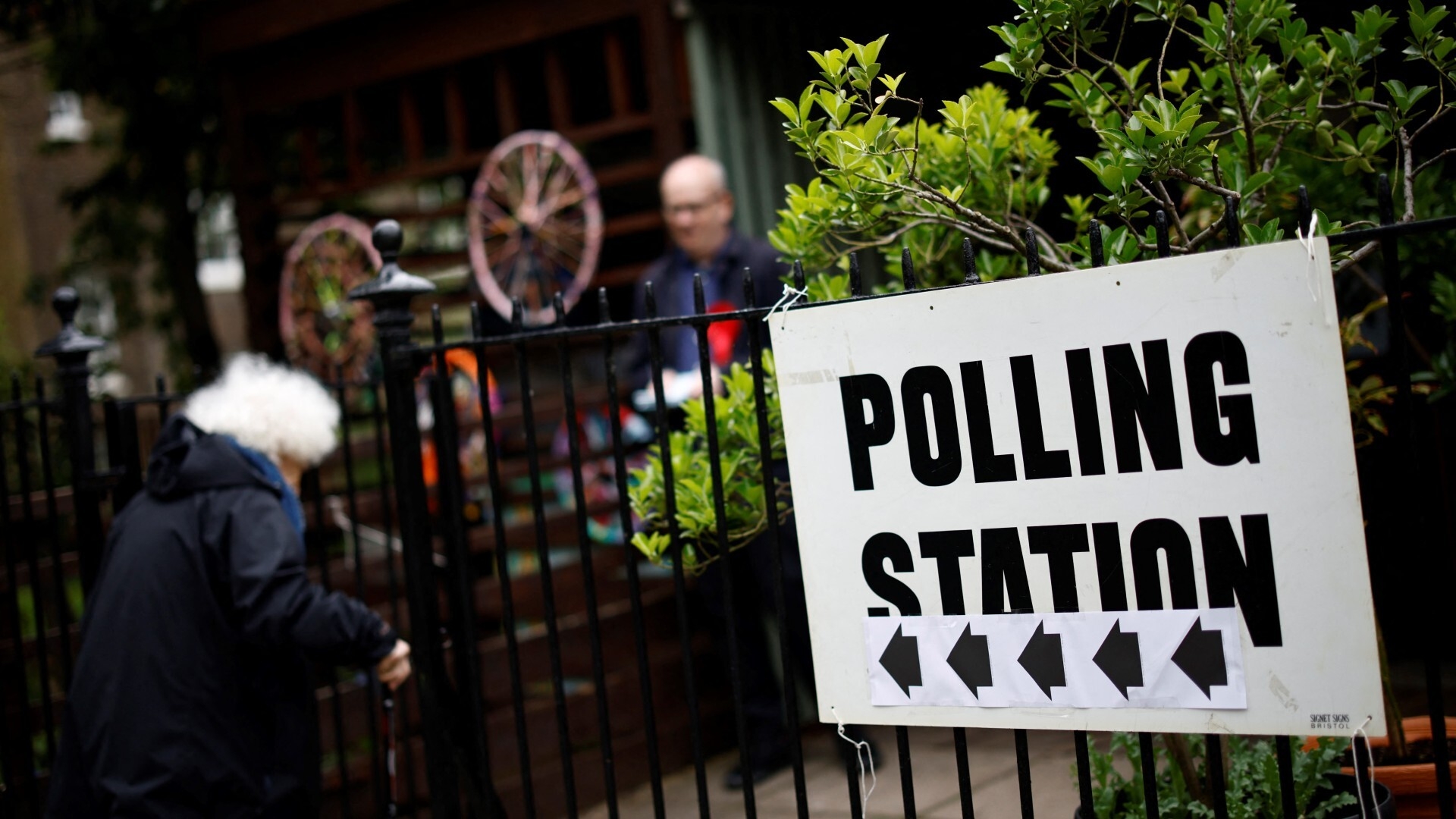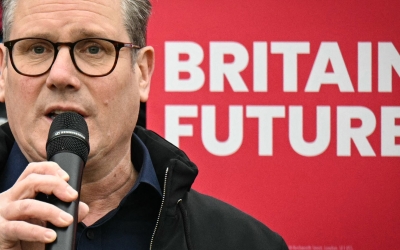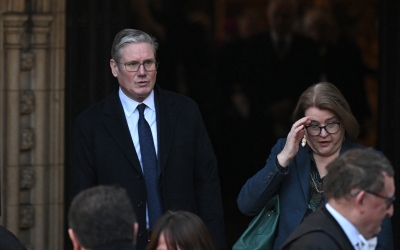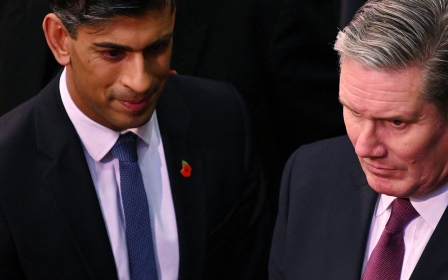Thank you, Muslim voters, for injecting principles and decency into British democracy

(AFP)
For many years, the mainstream media and political class have portrayed Muslims as an “enemy within” which refuses to engage with British democracy and cultivates a separatist agenda.
That line of attack has always been false, and last week was decisively proved wrong.
British Muslims made a massive intervention in the May elections. They abandoned Labour, voting instead for independent parties which support a ceasefire and have condemned Israeli atrocities in Gaza.
By doing so they sent out a message to Keir Starmer that his slavish support for Israel's Prime Minister Benjamin Netanyahu may cost his party dozens of seats in the looming general election.
You might have thought British Muslims deserved praise for their principled engagement in UK politics.
New MEE newsletter: Jerusalem Dispatch
Sign up to get the latest insights and analysis on Israel-Palestine, alongside Turkey Unpacked and other MEE newsletters
If so, you would have been wrong. Over the weekend their enemies simply changed their line of attack. British Muslims, say mainstream politicians and mass media, now present an even more deadly threat to British democracy: sectarianism.
'Foments hatred'
Take for example the splash headline in the Daily Mail: "Dozens of pro-Gaza activists elected."
In the words of Chris Doyle, the respected director of the Council for Arab-British Understanding, this was “one of the worst most dangerous front pages ever on a British publication” - one that “foments hatred and risk lives”.
I can understand how Doyle reached his judgment.
The Daily Mail failed to mention in its coverage that over 34,700 Palestinians have, according to Gaza's health ministry, been slaughtered over the last seven months.
In all probability, with many bodies trapped under the rubble, the number is much higher. Nearly 15,000 of the dead are children. A similar rate of attrition in the United Kingdom would mean more than one million Britons dead, with several million more injured.
In such terrible circumstances, it’s only natural that Muslim voters should rise up against Starmer and Prime Minister Rishi Sunak’s cross-party coalition in support of Israel’s far-right prime minister, Netanyahu.
A coalition, remember, which backs the supply of arms to the Israeli military as it bombards Gaza, refuses to call out Israeli war crimes, has defunded Unrwa, and opposes the International Court of Justice investigation into possible Israeli genocide.
And, of course, it’s not just Muslims who are horrified by the line taken by our two main party leaders. So are countless other Britons, including many Jews.
Principled opposition
In this terrible moment in the history of the Middle East, there’s nothing wrong with being a "pro-Gaza activist”, to use the clumsy Daily Mail formulation.
In fact, the phrase is surely synonymous with support for human decency and principled opposition to the indiscriminate slaughter being carried out by the Israeli army.
There’s nothing wrong with being a 'pro-Gaza activist' … In fact, the phrase is surely synonymous with support for human decency
To the Daily Mail, by contrast, such activism is "sinister". Most of the British media agrees. The BBC awarded its flagship interview on Sunday morning in the aftermath of the elections to Suella Braverman, the former home secretary, who was sacked after calling peace protests "hate marches”.
And so do the politicians.
Take Labour’s instant reaction to the defection of Muslim voters last week. A party "source" told the BBC they believed the West Midlands Conservative mayor, Andy Street, was on course to win as a result of the “Middle East not the West Midlands” and called Hamas the “real villains”.
Labour’s high command moved quickly to disown this remark, with its unevidenced insinuation that voters appalled by Labour policy on Gaza support Hamas. But this off-the-record Labour briefing echoed an earlier Labour Party briefing which referred to Muslims leaving Labour as “shaking off the fleas”. Ugly, dehumanising, racist language.
Do not forget that Islamophobia is rife within Starmer’s Labour. Ali Milani, Labour's candidate against Boris Johnson in Uxbridge in 2019, highlighted this inconvenient fact in a devastating interview with Middle East Eye.
More recently, Al Jazeera’s Labour Files exposed a “secret party dossier that was used to disenfranchise around 5,000 mostly Muslim members of the Labour Party in the ethnically diverse community of Newham”.
The Martin Forde KC report into racism inside Labour confirmed that Labour has a serious Islamophobia problem. Though not as dreadful as Sunak’s Conservatives.
Patriotic
As I set out in a series of investigative articles for MEE, the Conservatives persistently smear and target Britain’s Muslim minority, always operating in alliance with a poisonously Islamophobic mass media.
This does raise the urgent question: how should Muslims vote at a time when the two main political parties have turned virulently against them? It would have been entirely understandable had British Muslims recoiled from a democratic system that has treated them with disdain and contempt.
Hearteningly they did not do so. They did not reject British democracy. Instead, they turned their back on a rotten two-party system that has chosen to target and despise Muslims rather than give them a voice.
To sum up, British Muslims have voted in a patriotic way. Over the last few months, most voters, though not the political and media classes, have supported an immediate ceasefire. Last week, Muslims provided non-Muslim Britons with a lead by sending a warning to the political establishment.
Most important of all, their votes have had an effect. On Monday, Starmer, who for so long saw his role as Westminster point man for Netanyahu, suddenly changed his tune.
He demanded that Netanyahu should abandon plans for a Rafah offensive, and called for an immediate ceasefire.
This was new language from Starmer. It would never have happened but for last week’s Muslim vote.
The views expressed in this article belong to the author and do not necessarily reflect the editorial policy of Middle East Eye.
Middle East Eye delivers independent and unrivalled coverage and analysis of the Middle East, North Africa and beyond. To learn more about republishing this content and the associated fees, please fill out this form. More about MEE can be found here.







